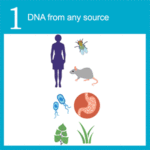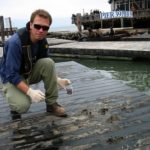To characterize the functions of genes in newly discovered bacteria, microbiologists introduce mutations using mobile DNA snippets called transposons delivered via a vector. But finding an effective transposon mutagenesis system for a novel microorganism through trial and error can be a time-consuming and expensive endeavor.
To streamline the process, Environmental Genomics and Systems Biology (EGSB) Division researchers, led by Adam Deutschbauer and Adam Arkin, have developed a new technique to test hundreds of different transposon vector variants in parallel within what the investigators term “magic pools.”
The approach was detailed in mSystems, an open access journal from the American Society for Microbiology.








